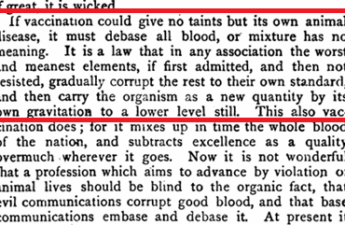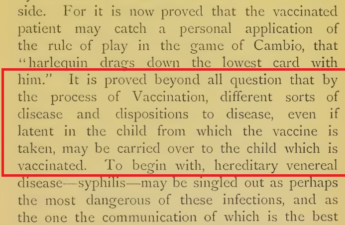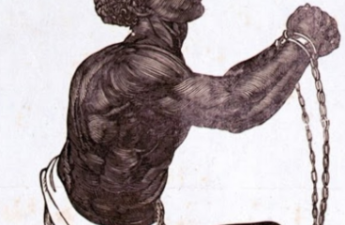
(credit)
by Steve Halbrook
With vaccination being a discredited and evil practice that no society should tolerate, what then can a nation do to minimize the spread of dangerous diseases? Throughout Christian history, a major solution has been quarantine.
The concept of quarantine, or the isolating of those infected with a contagious disease, stretches far back in history. In the Old Testament, for example, it was used for those infected with leprosy (see Leviticus 13).
An example of the application of quarantine in the time of Christendom is found in the Crusades:
The crusaders on their arrival outside the walls of Jerusalem found lazarettoes still in existence, and after taking the city from the Mussulmans sent all contagious maladies to these isolated places. The name Hospital of St. Lazarus was given to the place of sequestration. Returning to Europe, the members of the military expeditions brought back with them not only numerous diseases, but also the word “lazaretto,” as applied to a place for the isolation of the victims of communicable maladies. As a result lazarettoes were built outside the gates of nearly all the principal cities of Europe.[1]
One of the first modern quarantine practices began in 1377 at the seaport of Ragusa, today known as Dubrovnik (Croatia).[2] To help prevent the spread of diseases, a law was passed where
visitors from areas where plague was endemic would not be admitted into Ragusa until they had remained in isolation for a month; whoever did not observe this law would be fined and subjected to a month of isolation; no one from Ragusa was allowed to go to the isolation area; people not assigned by the Great Council to care for quarantined persons were not allowed to bring food to isolated people.[3]
Note how the Great Council made provisions for those quarantined by assigning individuals to provide care for them.

— William Wilberforce
Shortly after in 1423, Venice established on a neighboring island a quarantine station which set an example for other European countries to follow.[4]
R. J. Rushdoony makes these favorable comments about quarantine laws throughout Christian history:
It is also important to note that the observance of these laws helped eliminate Hansen’s disease, or true leprosy, faster in Europe than in other continents. In Europe, there were at least 9,000 hospitals for leprosy alone, maintained by Christian charity. Louis VII of France left legacies to more than 2,000 hospitals for lepers in his country; no ruler of our times has manifested any comparable charity. The Normans in France applied quarantine strictly, both in Normandy and in England. Thus, the very wealthy and influential Knight, Amiloun, was expelled from his castle to become a beggar when he contracted leprosy. The Lateran Council of 1172 required that special churches be built for lepers, and, in time, both hospitals and churches were available for lepers.[5]
To the American Puritans, quarantine was also an important practice:
As far back as 1629, the General Court of Massachusetts Bay Colony acted to protect the public health by limiting the number of passengers on each ship carrying migrants to the new colony. In 1647, when the General Court learned of epidemics in the West Indies, it ordered a quarantine of all ships arriving from those ports. That order began a pattern of maritime quarantines in response to threats of epidemics. The General Court attempted to codify the practice in 1699, but the English Privy Council rejected the measure as too harsh. In 1701, legislation was finally enacted.
The quarantine legislation was a blueprint for the era. Relying on the assumption that certain illnesses were contagious, the statute aimed at preventing epidemics by restraining the social contacts of infectious individuals or goods. The legislation not only called for the quarantine of potentially infectious ships, it also empowered local selectmen to remove to a separate house or isolate anyone with plague, smallpox, or other “pestilential or malignant fever[s].” As was evident in the English laws and earlier informal local practice, the statute did not merely restrain the freedom of those stricken. It also authorized selectmen to provide for the care of the ill by impressing housing, nurses, or whatever was necessary.
The quarantine policies established by the 1701 law were carried out and modified throughout the colonial period. The law was followed in the smallpox epidemic of 1702. In 1717, a pesthouse hospital was built with public money on Spectacle Island in Boston Harbor. By the 1720s, the Massachusetts quarantine system had become regularized. Some public health historians feel that this system may have helped to reduce the incidence of disease in New England.[6]
The great Christian social reformer, William Wilberforce, said this of quarantine:
The laws of quarantine have continued long enough to be enforced, and have been found to be attended with infinite advantage. [7]
Quarantine, then, is a rational approach to dealing with infectious diseases, as it keeps disease carriers from those without diseases at a safe distance. It is not intended as a punishment; it restricts one’s freedom only to keep him from harming others—while at the same time avoiding the utilitarian evil of executing him in order to best prevent him from spreading the disease.
Likewise, quarantine avoids the utilitarian evil of harming or even murdering someone via vaccination in the name of keeping one from getting, and then spreading, a disease.
While discussing the leprosy quarantine laws in Scripture, G. Campbell Morgan makes the following comments that characterize just quarantine measures:
In the instructions two principles of perpetual importance are manifested. The first is the necessity for guarding the general health of the community and the second is that no injustice be done to the individual in the interest of the community. These two principles are perpetual in their application.[8]
Quarantine, one of the state’s primary tools for fighting dangerous infectious diseases (along with good hygiene and sanitation), has taken a backseat to vaccinating the entire population (even for benign diseases!) with substances that harm and even kills its recipients — and can even result in the spread of the very disease that the vaccine is supposed to combat!
We see how twisted our thinking has become: instead of prioritizing shielding people from those with dangerous infectious diseases, we prioritize injecting everyone with deadly toxins and disease. When evil reigns, everyone loses. Vaccination has surpassed naturally-acquired diseases as the greatest public health threat.
Notes
___________________________________
[1] John Macauley Eager, The Early History of Quarantine: Origin of Sanitary Measures Directed Against Yellow Fever (Washington: Government Printing Office, 1903), 4, 5.
[2] Gian Franco Gensinia, Magdi H. Yacouba, and Andrea A. Contia, “The concept of quarantine in history: from plague to SARS,” Journal of Infection (2004) 49, 258. Retrieved February 16, 2015 from http://www.birdflubook.org/resources/0Gensini257.pdf.
[3] Ibid., 258, 259.
[4] Ibid., 259.
[5] Rousas John Rushdoony, Commentaries on the Pentateuch: Leviticus (Vallecito, CA: Ross House Books, 2005), 144, 145.
[6] Wendy E. Parmet, “Public Health Practices in the Colonial and Federalist Periods.” Retrieved February 17, 2015 from http://academic.udayton.edu/health/syllabi/bioterrorism/4phealthlaw/PHLaw00c.htm. Internet piece excerpted from Wendy E. Parmet, “Health Care and the Constitution: Public Health and the Role of the State in the Framing Era,” 20 Hastings Constitutional Law Quarterly (Winter, 1992) 267-335, 285-302.
[7] Hansard, Vaccine Inoculation, vol 7 cc879-99 (UK Parliament, July 2, 1806). Retrieved April 18, 2019, from https://api.parliament.uk/historic-hansard/commons/1806/jul/02/vaccine-inoculation#S1V0007P0_18060702_HOC_21
Sadly, as evidenced in this speech, Wilberforce was favorable to smallpox vaccination. We all have our blind spots.
[8] G. Campbell Morgan, An Exposition of the Whole Bible (Westwood, NJ: Flemming H. Revell, 1959), 11. Cited in Rushdoony, Commentaries on the Pentateuch: Leviticus, 136.
Image credit:
___________________
Passengers on a ship undergoing quarantine examination during the Egyptian cholera epidemic of 1883. Wood engraving, 1883. Credit: Wellcome Collection. CC BY 4.0
If you find this site helpful, please consider supporting our work.


